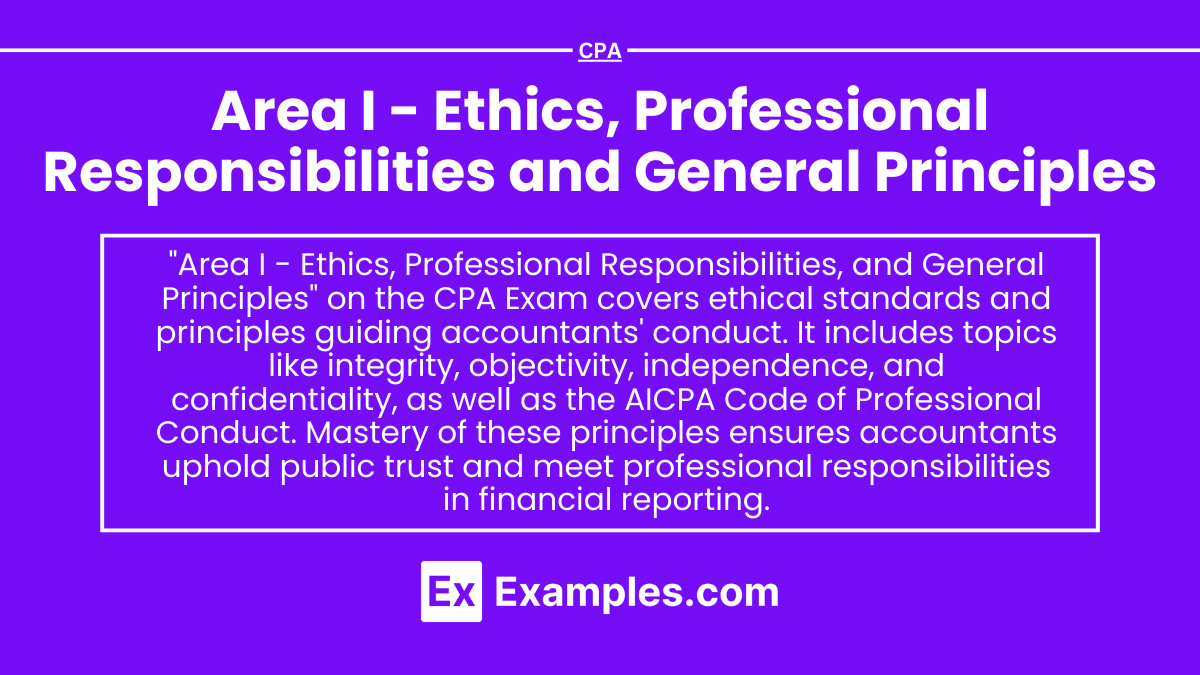Preparing for the CPA Exam demands a deep understanding of Area I – Ethics, Professional Responsibilities, and General Principles. This foundational segment emphasizes the ethical standards, professional obligations, and overarching principles that govern the accounting profession. Mastery of these elements is crucial for safeguarding public interest and maintaining the integrity of financial practices, essential for achieving a high CPA score.
Learning Objective
In studying “Area I – Ethics, Professional Responsibilities, and General Principles” for the CPA Exam, you should aim to understand and internalize the ethical standards and professional responsibilities critical to the accounting profession. Learn to analyze and apply these principles in various scenarios, encompassing issues of confidentiality, integrity, and objectivity. Delve into the concepts of independence and due care, and evaluate their importance in maintaining public trust. Further, explore regulatory compliance across different jurisdictions and industries. Develop the ability to integrate these ethical frameworks and responsibilities into practical decision-making processes, essential for successfully navigating the CPA Exam and future professional challenges.
Understanding Ethical Standards in Accounting
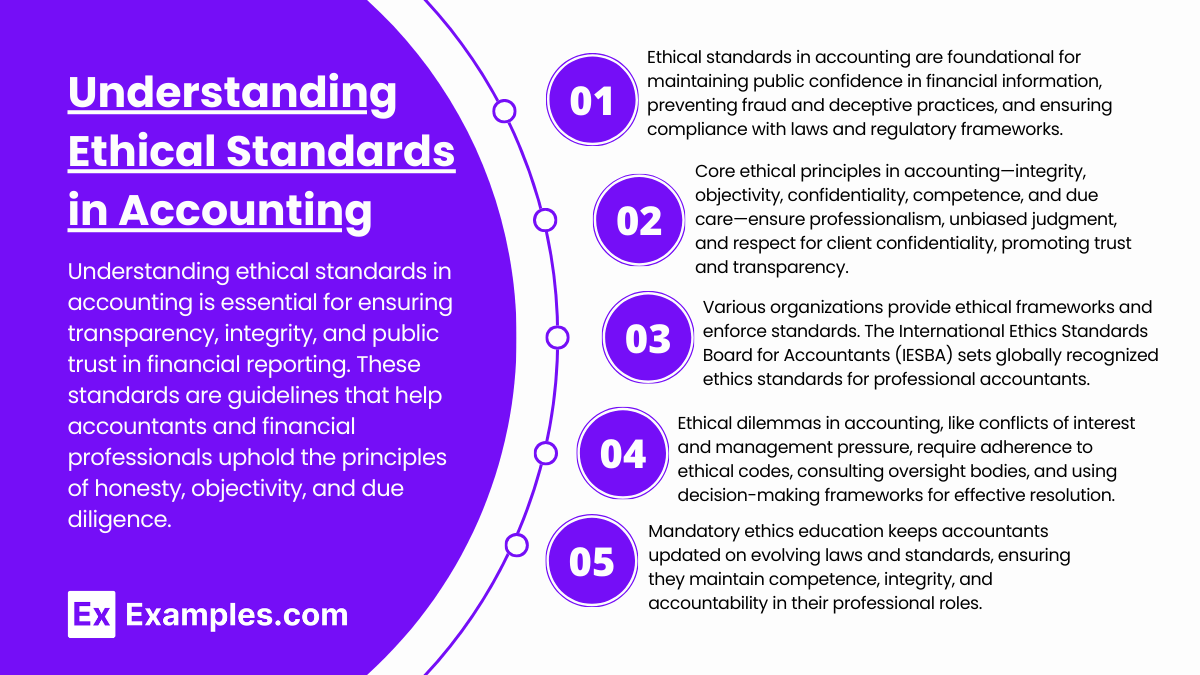
Understanding ethical standards in accounting is essential for ensuring transparency, integrity, and public trust in financial reporting. These standards are guidelines that help accountants and financial professionals uphold the principles of honesty, objectivity, and due diligence. Here’s a detailed breakdown of the key aspects:
- Importance of Ethics: Ethical standards in accounting are foundational for maintaining public confidence in financial information, preventing fraud and deceptive practices, and ensuring compliance with laws and regulatory frameworks. This is critical as stakeholders rely on accurate and honest reporting to make informed decisions.
- Core Ethical Principles:
- Integrity: Accountants are expected to present information truthfully and accurately, avoiding any actions that mislead or deceive.
- Objectivity: Professionals must remain impartial and independent, avoiding conflicts of interest and making decisions based on unbiased evidence.
- Confidentiality: Confidential information received as a result of professional and business relationships should not be used for personal benefit or disclosed without proper authority.
- Professional Competence: Accountants should maintain their ability to perform competently, updating their skills and knowledge continually through professional development.
- Due Care: The application of diligence and judgment in providing professional services ensures that services are carried out with competence and thoroughness.
- Ethical Standards Bodies: Various organizations provide ethical frameworks and enforce standards. The International Ethics Standards Board for Accountants (IESBA) sets globally recognized ethics standards for professional accountants. In the U.S., the American Institute of Certified Public Accountants (AICPA) provides a code of ethics that includes principles and rules covering areas like independence and due care. The Financial Reporting Council (FRC) in the UK oversees auditors, accountants, and actuaries, holding them to high ethical standards.
- Resolving Ethical Dilemmas: Ethical dilemmas in accounting can arise from conflicts of interest, pressure from management, or unclear regulations. Accountants should refer to their respective ethical codes, consult with ethical oversight bodies, and apply structured ethical decision-making frameworks to resolve these issues effectively.
- Continuing Education: To keep up with evolving laws, regulations, and ethical norms, continuing education in ethics is mandatory for accountants. This education helps them remain competent and perform their roles with integrity and accountability.
Professional Responsibilities and Due Care
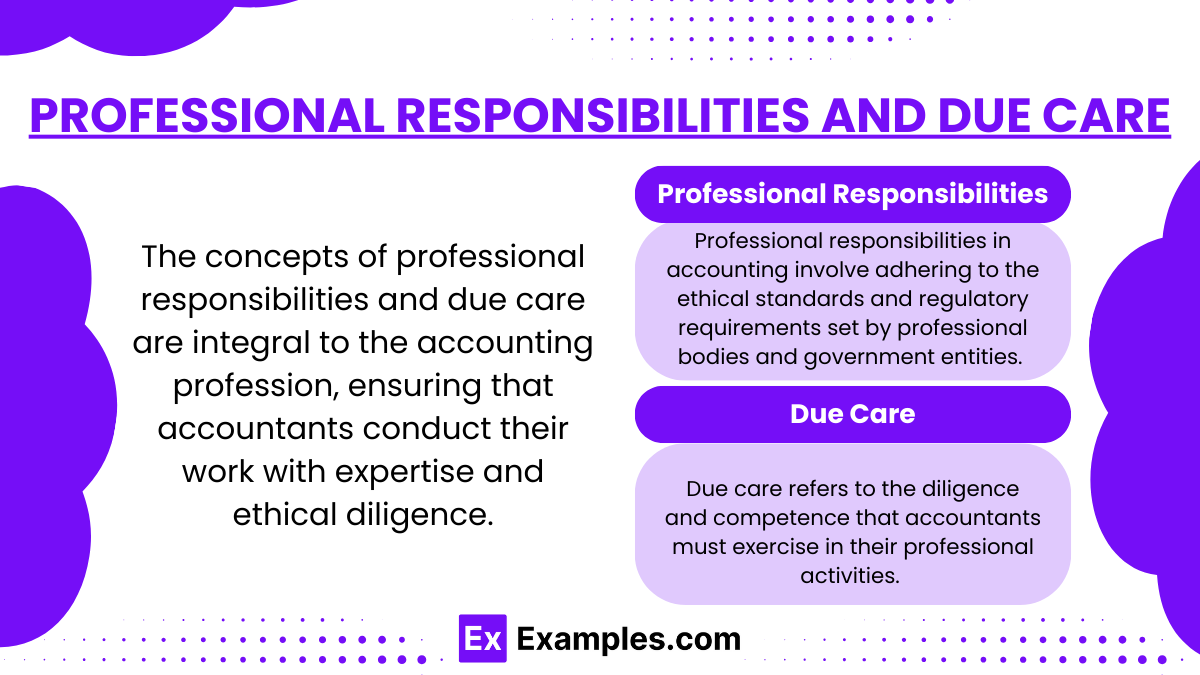
The concepts of professional responsibilities and due care are integral to the accounting profession, ensuring that accountants conduct their work with expertise and ethical diligence. Here’s a deeper look at these principles:
Professional Responsibilities
Professional responsibilities in accounting involve adhering to the ethical standards and regulatory requirements set by professional bodies and government entities. This encompasses several key areas:
- Ethical Conduct: Accountants must uphold the ethical standards of the profession, including integrity, objectivity, and independence. This ensures that their work is free from bias and conflicts of interest, fostering trust among clients and the public.
- Regulatory Compliance: Accountants must comply with the laws and regulations applicable to their work, whether they are preparing financial statements, auditing, or providing tax advice. This includes following standards such as GAAP (Generally Accepted Accounting Principles) or IFRS (International Financial Reporting Standards).
- Quality Control: Ensuring the quality of their work through rigorous checks and balances is a fundamental responsibility. This includes internal reviews, adherence to professional standards, and continuous improvement practices.
Due Care
Due care refers to the diligence and competence that accountants must exercise in their professional activities. It is a commitment to:
- Competence: Accountants should maintain and continuously update their skills and knowledge to remain effective in their roles. This involves ongoing education and professional development to keep abreast of industry changes, new laws, and evolving standards.
- Thoroughness: Due care requires thorough and detailed work, ensuring that all financial documentation is accurate and complete. This mitigates the risk of errors or omissions that could lead to financial misstatements or legal issues.
- Timeliness: Delivering work in a timely manner is also a component of due care. Delays in reporting financial information can have significant implications for decision-making by management, investors, and other stakeholders.
- Professional Skepticism: An attitude of professional skepticism involves questioning assumptions and not taking information at face value. It is crucial for auditors, particularly, to critically assess and verify the information they are auditing.
- Documentation: Proper documentation supports the work done, providing evidence of the processes followed and the conclusions reached. It is essential for accountability and serves as a reference if the work is later reviewed or challenged.
Independence in Accounting Practice
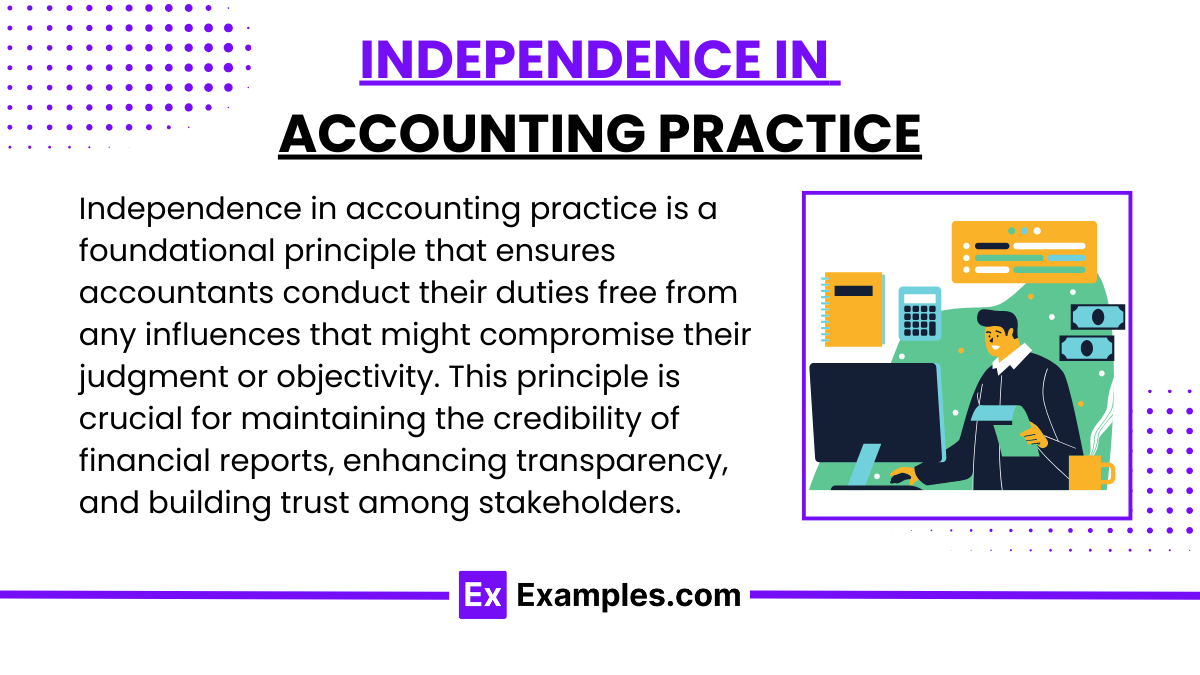
Independence in accounting practice is a foundational principle that ensures accountants conduct their duties free from any influences that might compromise their judgment or objectivity. This principle is crucial for maintaining the credibility of financial reports, enhancing transparency, and building trust among stakeholders. Here’s a detailed look at the concept of independence in accounting:
- Independence means the ability to carry out accounting duties without influence that compromises professional judgment. It includes both independence of mind and independence in appearance.
- Importance: Upholding independence enhances transparency, builds trust among stakeholders, and is vital for credible financial reports.
- Threats to Independence: These include self-interest, self-review, advocacy, familiarity, and intimidation threats. Each of these can undermine an accountant’s objective decision-making.
- Safeguards:
- Adherence to professional standards and ethical guidelines from bodies like the AICPA or IESBA.
- Firm policies that support independence, such as personnel rotation on audits and conflict-of-interest rules.
- Regular external reviews and internal controls to ensure compliance with independence standards.
- Ongoing education and training on the importance of independence and its threats.
- Role-Specific Requirements: While auditors must strictly maintain independence, professionals in roles like tax advisory or consulting also need to ensure objectivity, though the strictness of independence requirements may vary.
Regulatory Compliance and Legal Obligations
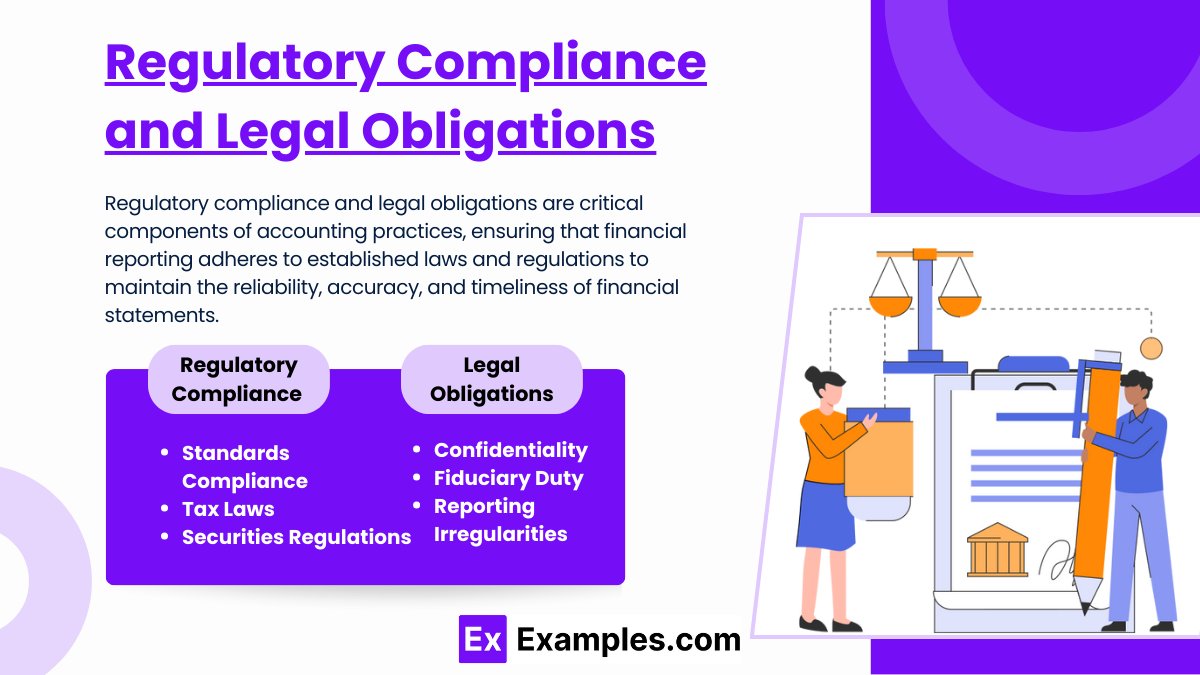
Regulatory compliance and legal obligations are critical components of accounting practices, ensuring that financial reporting adheres to established laws and regulations to maintain the reliability, accuracy, and timeliness of financial statements. Here’s a succinct overview of these elements in the accounting field:
Accountants must navigate a complex landscape of regulations and legal requirements, which vary depending on the jurisdiction and the specific area of practice. Compliance ensures that financial information is transparent and consistent, reducing the risk of fraud and corruption, and increasing trust among investors, regulators, and the public.
Key Aspects of Regulatory Compliance
- Standards Compliance: Accountants must adhere to generally accepted accounting principles (GAAP) in the U.S., or international financial reporting standards (IFRS) globally. These standards dictate how financial transactions should be recorded and reported.
- Tax Laws: Compliance with federal, state, and local tax laws is crucial. This includes the accurate calculation, reporting, and timely payment of taxes owed by individuals and businesses.
- Securities Regulations: For companies that are publicly traded, strict compliance with securities regulations, such as those enforced by the Securities and Exchange Commission (SEC) in the U.S., is essential. These regulations ensure that all financial disclosures are fair and comprehensive to protect investors.
Legal Obligations
- Confidentiality: Accountants are legally bound to protect the confidentiality of their clients’ financial information, only disclosing it when authorized or legally required to do so.
- Fiduciary Duty: In some roles, accountants act as fiduciaries, meaning they are obligated to act in the best interests of their clients, placing the clients’ interests ahead of their own.
- Reporting Irregularities: If accountants discover financial irregularities or illegal activities, they may be required to report these findings to the relevant authorities, depending on the legal context and the specifics of the situation.
Examples
Example 1: Confidentiality in Client Relations
- An accountant is offered a lucrative deal to share confidential financial details of a high-profile client with a competitor. The accountant must navigate this ethical dilemma by adhering to the confidentiality principles outlined in the AICPA Code of Professional Conduct, declining the offer, and perhaps reporting the incident to the appropriate authorities.
Example 2: Maintaining Independence
- An auditor, who has a close family member working in a senior financial position at a client company, must decide how to maintain independence. This scenario requires the auditor to either recuse themselves from the audit or disclose the relationship and assess whether adequate safeguards can be put in place to maintain independence.
Examples 3: Handling of Fraudulent Activity
- During a routine audit, an accountant discovers evidence of ongoing financial fraud within a corporation. The professional responsibility entails reporting the finding through the proper channels within the company (like the audit committee) and, if necessary, to external authorities, while ensuring compliance with legal and ethical standards.
Examples 4: Conflict of Interest
- An accountant providing consulting services to a business is offered a position on the company’s board. The professional must evaluate whether accepting this position could impair their objectivity and independence, potentially leading to a conflict of interest.
Examples 5: Ethical Decision-Making in Taxation
- A tax accountant is pressured by a client to aggressively minimize tax liabilities using methods that border on legal grey areas. The accountant must weigh the ethical implications, consider the long-term consequences for the client and themselves, and decide to adhere to the principle of integrity by advising against such practices.
Practice Questions
Question 1
What action should an accountant take if they discover that their client has been omitting taxable income in their financial statements?
A. Ignore the issue as it is the client’s responsibility.
B. Report the issue to the IRS without notifying the client.
C. Discuss the issue with the client and advise them to correct the financial statements.
D. Amend the financial statements without consulting the client.
Answer: C
Explanation:
Step 1: Understanding the Question
The question deals with the ethical responsibilities of an accountant when they discover fraudulent activity by their client.
Step 2: Analyzing Each Option
- A is incorrect because ignoring such issues violates ethical standards regarding integrity and professional behavior.
- B is premature and could breach confidentiality agreements; it’s essential to address the issue with the client first.
- C is the correct approach as it involves addressing the problem directly with the client, providing them an opportunity to correct their actions.
- D is incorrect because making changes unilaterally can violate the client’s autonomy and might not address the root of the issue.
Step 3: Conclusion
The best ethical and professional practice is to discuss the issue with the client and advise them to make the necessary corrections, aligning with professional standards of integrity and due care.
Question 2
An auditor discovers that a significant error in last year’s audit report resulted in overstated revenue. What should the auditor do first?
A. Issue a revised report immediately.
B. Discuss the error with the audit team to verify the findings.
C. Inform the client and discuss how to address the error.
D. Cover up the error to maintain the firm’s reputation.
Answer: B
Explanation:
Step 1: Understanding the Question
This question addresses the steps an auditor should take upon discovering an error in a previous report.
Step 2: Analyzing Each Option
- A is premature without verification of the error.
- B is the correct initial step; verifying the findings within the audit team ensures accuracy before taking further actions.
- C would be the next step after confirming the error, not the first.
- D is unethical and against all professional standards.
Step 3: Conclusion
Verifying the findings with the audit team ensures accuracy and professional due diligence before further actions are taken.
Question 3
Which of the following best describes the principle of professional behavior in the AICPA Code of Professional Conduct?
A. Accountants should engage in marketing practices that enhance the profession’s reputation.
B. Accountants must refrain from actions that discredit the profession.
C. Accountants are allowed to accept gifts from clients if disclosed.
D. Accountants should prioritize their firm’s interests over ethical considerations.
Answer: B
Explanation:
Step 1: Understanding the Question
This question asks for the best description of professional behavior according to the AICPA Code.
Step 2: Analyzing Each Option
- A is incorrect as marketing practices are not directly mentioned under professional behavior principles.
- B is correct as it succinctly summarizes the principle that accountants should avoid actions that could damage the profession’s integrity.
- C is misleading; while accepting gifts might be permissible under specific circumstances, it does not broadly represent professional behavior.
- D is incorrect and unethical, as ethical considerations should always prevail.
Step 3: Conclusion
Refraining from actions that discredit the profession encapsulates the essence of professional behavior in the AICPA Code of Professional Conduct.

